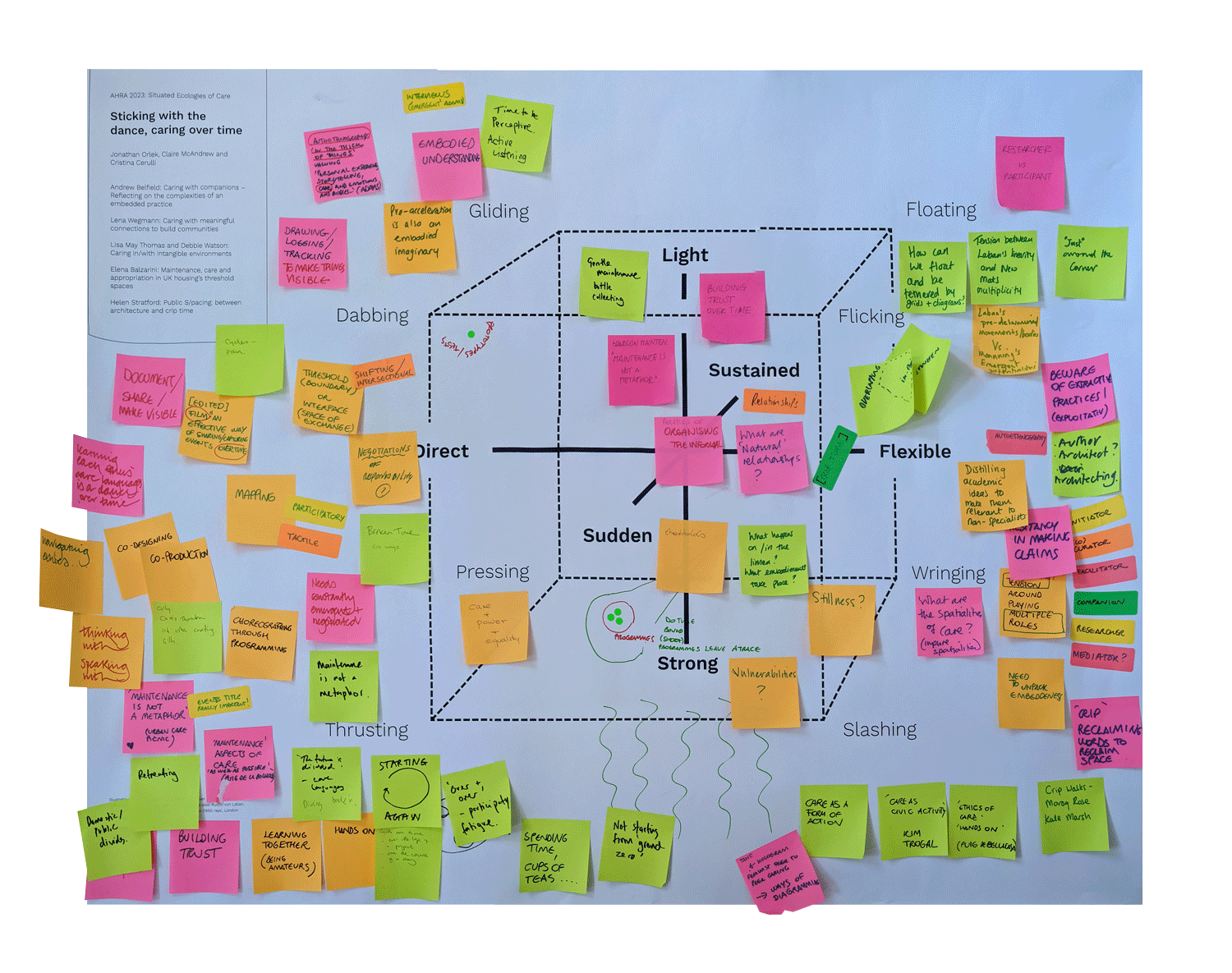Sticking with the dance, caring over time
Some members of the Caring—with Cities team (Orlek, McAndrew, Cerulli and Ferreri) proposed and curated a session at the Architectural Humanities Research Association (AHRA) International Conference: Ecologies of Care (25-27 October 2023, Portsmouth).
In our session, titled Sticking with the dance, caring over time, we set out to facilitate encounters and interferences through a re-turning of the works of selected contributors with participants, bringing forth new temporal perspectives on caring practices within the city.
In the Caring—with Cities project we explored entanglements between care practices and expanded modes of situated spatial production, making use of Joan Tronto’s idea of ‘caring—with’ (2015). This project spoke to a dance of caring acts, moving back and forth across entangled boundaries, configuring states of becoming and with this, reiterative expectations of care over time (Ferreri et al., 2022; Orlek et al., 2023). From our data we observed how boundaries were produced and reconfigured through acts of opening-up/closing-off, the adoption of multiple project positions, and careful choreographing of participatory encounters across actors/objects.
For our session at AHRA 2023 we set out to further consider this intra-action of lived experiences and articulations of care, in relation to feminist posthuman philosophical thinking on movement and entanglement. We looked to Karen Barad’s (2007) ‘diffraction’ as a double movement where ‘re-turning’ is seen not as reflecting on a past, but method of seeing new possibilities by ‘turning it over and over again’ (Barad, 2014) and Erin Manning’s (2009) ‘preacceleration’ in movements on the verge of expression, with ‘the potential of what is not-yet’. For both, there is no singular point that marks the beginning, middle or end.
The selected contributors for the session – Andrew Belfield, Lena Wegmann, Dr Lisa May Thomas & Prof. Debbie Watson, Elena Balzarini, Dr Helen Stratford – presented a range of work addressing the questions raised in our call, specifically reflecting on:
- Different caring frameworks, articulations, languages
-
Embedded case studies on mutual caring practices over time
-
Reflexive-/auto- ethnographies and other research methods
involving long-term research commitments
-
Activist strategies for sustaining careful practices and
movements
We curated the session as a series of presentations complemented by ‘active transitions’ and a concluding roundtable, both around a physical design prop. This prop was a large diagram (pictured) based on Laban’s dynamosphere and we used it as a catalyst for ‘diffractive’ readings of the works presented ‘“through one another”, to engender creative, and unexpected outcomes’ (Geerts & van der Tuin, 2021). We invited session participants to add to the diagram during the transitions between presentations and the roundtable at the end of the session. Specifically, we used the dynamosphere as a framing device for conversations around the notions of effort as a combination of time, space and weight –and to collectively unpack notions of effort within caring—with practices over time.
Barad, K. (2014). Diffracting Diffraction: Cutting Together-Apart. Parallax, 20(3), 168–187. https://doi.org/10.1080/13534645.2014.927623
Barad, K. (2007). Meeting the Universe Halfway: Quantum Physics and the Entanglement of Matter and Meaning. Duke University Press.
Ferreri, M., McAndrew, C., Cerulli, C., Ratcliffe, E., Cavada, M., & Orlek, J. (2022). Caring—With Cities: Project Report. https://caringwith.city/Publications
Geerts, E., & van der Tuin, I. (2021). Diffraction & Reading Diffractively. Matter: Journal of New Materialist Research, 3(1), 173–177. https://doi.org/10.1344/jnmr.v2i1.33380
Manning, E. (2009). Relationscapes: Movement, Art, Philosophy. MIT Press.
Orlek, J., McAndrew, C., Cerulli, C., Ferreri, M., Cavada, M., & Ratcliffe, E. (July 2023). For a relational understanding of care in critical urban action and mapping. Lo Squaderno: Care and Critical Action, 65.
Tronto, J. C. (2015). Who Cares?: How to Reshape a Democratic Politics. Cornell Selects.

 Using Laban’s ‘dynamosphere’ diagram to read
presentations ‘through one another’ and reflect on the efforts behind care over time within
the projects discussed.
Using Laban’s ‘dynamosphere’ diagram to read
presentations ‘through one another’ and reflect on the efforts behind care over time within
the projects discussed.